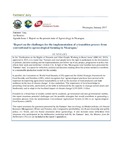| dc.contributor.author | Sánchez Gutiérrez, Julio Héctor | |
| dc.contributor.author | Vásquez Zeledón, Jorge Irán | |
| dc.contributor.author | Ripoll Lorenzo, Santiago | |
| dc.date.accessioned | 2018-01-31T16:04:36Z | |
| dc.date.available | 2018-01-31T16:04:36Z | |
| dc.date.issued | 2017 | |
| dc.identifier.citation | Sánchez Gutiérrez, J.H., Vásquez Zeledón, J.I. and Ripoll Lorenzo, S. (2017) Report on the Challenges for the Implementation of a Transition Process from Conventional to Agroecological Farming in Nicaragua, IDS: Brighton | en |
| dc.identifier.uri | https://opendocs.ids.ac.uk/opendocs/handle/20.500.12413/13532 | |
| dc.description.abstract | In the ‘Declaration on the Rights of Peasants and Other People Working in Rural Areas’ (HRCAC 2013), approved in 2013, it is stated that ‘Farmers and rural people have the right to participate in the formulation of policies, decision-making and the implementation and follow-up of any project, programme or policy that affects their lands and territories’ (Article 2.4). In light of this, Nicaraguan rural families have promoted the ‘Farmers’ Jury’ as a space for reflection, analysis and decision-making about the actions needed to contribute to a sustainable production model for the country. In parallel, the Committee on World Food Security (CFS) approved the Global Strategic Framework for Food Security and Nutrition (GSF), which recognises that ‘agroecological practices have proved to be important in improving agricultural sustainability as well as the incomes of food producers and their resilience in the face of climate change’. It also underlines ‘The importance of local knowledge in promoting food security, particularly as the latter is influenced by the capacity to manage natural assets and biodiversity and to adapt to the localized impact of climate change’ (CFS 2010: 2.02m). Founded on a broad base of studies carried out by academic, governmental and non-governmental entities, this report examines potential challenges and the possible strategies that would contribute to generating a transition process from the predominant Conventional Agricultural System (CAS) to an Agroecological Food System (AEFS). The report examines the questions presented by the Farmers’ Jury involving: (i) Market policies; (ii) Natural Resource Management (Water and Forests); (iii) Comparative profitability; (iv) Land ownership and public policy; (v) Youth, and (vi) Social awareness about agroecology. It also includes some reflections from witnesses who participated in the deliberative workshop held by the Farmers’ Jury, the Minutes from the Deliberative Process are included in the report’s appendices. | en |
| dc.description.sponsorship | Daniel & Nina Carasso Foundation | en |
| dc.description.sponsorship | New Field Foundation | en |
| dc.language.iso | en | en |
| dc.publisher | IDS | en |
| dc.rights.uri | http://www.ids.ac.uk/files/dmfile/IDSOpenDocsStandardTermsOfUse.pdf | en |
| dc.subject | Agriculture | en |
| dc.title | Report on the Challenges for the Implementation of a Transition Process from Conventional to Agroecological Farming in Nicaragua | en |
| dc.type | Other | |
| dc.rights.holder | STEPS/IDS/Land Workers’ Alliance | en |
| rioxxterms.funder | Default funder | en |
| rioxxterms.identifier.project | Default project | en |
| rioxxterms.version | NA | en |
| rioxxterms.funder.project | 9ce4e4dc-26e9-4d78-96e9-15e4dcac0642 | en |

